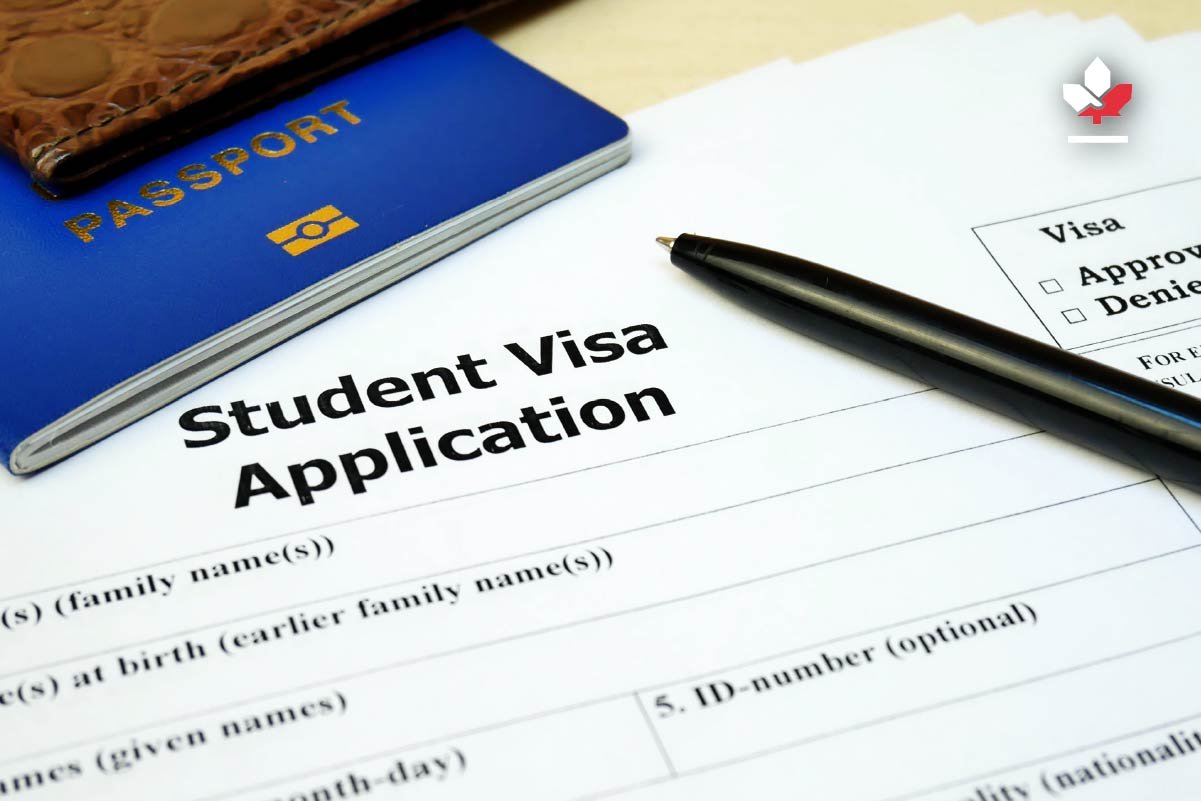Going on a journey to study abroad is an exciting opportunity, but it comes with many logistical challenges, starting with the visa application process. Compiling the documents for your Canada study visa application is one of the most critical steps in this process.
To ensure a smooth and successful application, it's important to understand what documents are required and how to organize them effectively. Our guide will walk you through your study visa checklist's essential items, covering everything from identification documents to financial statements.
What is a Canada Study Visa?

A Canada study visa, also known as a Canadian study permit, isn't a visa. It's a document issued by the Canadian government that allows foreign nationals to enroll and study at Designated Learning Institutions (DLIs) in Canada. These DLIs include universities, colleges, and some public and private schools. While short-term stays might be possible with just a visitor visa, most international students pursuing full-time studies in Canada require a study permit.
To obtain a Canada Study Visa, you must meet specific requirements, including proof of acceptance into a DLI, demonstrating language proficiency in English or French, showing evidence of financial support, and outlining your post-study plans. The visa application process involves filling out an online form, undergoing a medical examination, scheduling biometrics collection, and waiting for the application results, typically taking around 11 weeks.
What Documents Do You Need to Apply for a Canada Study Visa?

To be eligible to apply for a Canada study visa, you must obtain the following documents.
Proof of Acceptance
Your school must provide you with a Letter of Acceptance (LOA). Include your letter's original or electronic copy with your study permit application. If you're a post-secondary student, your school will be asked to ensure your acceptance letter is valid.
Should your school fail to respond within the provided time, your application will be returned, and you'll receive a refund for your processing fee. You must confirm with your school whether or not they will validate your letter of acceptance before you resubmit your application.
Note that you must take prerequisite courses if a DLI has conditionally accepted you. These courses may be English as a second language (ESL) or French as a second language, and they must be completed before you start your main study program.
It should also be noted that you don't need to provide a letter of acceptance from a DLI if you're a family member of someone with a study permit or work permit application that has been approved in writing.
Provincial Attestation Letter
You must provide a provincial attestation letter (PAL) from the province or territory you plan to study in Canada. The following provinces in Canada have provided processes that will enable you to obtain a PAL.
| Canadian Provinces or Territories | Implementation Date For PAL And How to Obtain a PAL |
|---|---|
| Manitoba | Began March 4,2024. Contact your DLI to find out how to apply for a PAL |
| Alberta | Began March 1, 2024. Contact your DLI to find out how to apply for a PAL |
| British Columbia | Began March 4, 2024. Contact your DLI to find out how to apply for a PAL |
| New Brunswick | Began March 18, 2024. Contact your DLI to find out how to apply for a PAL |
| Newfoundland and Labrador | Began March 19, 2024. Contact your DLI to find out how to apply for a PAL |
| Quebec | Obtain an attestation of issuance of your Quebec Acceptance Certificate (CAQ) from the Quebec government. |
| Saskatchewan | Began March 13, 2024. Contact your DLI to find out how to apply for a PAL |
| Other Canadian Provinces or Territories | All other provinces or territories are developing processes to issue PALs. All are expected to begin on March 31, 2024 |
Note that you don't need to provide a PAL if you applied to study in a preschool, primary school, or secondary school or applied to study for a master's or doctoral degree.
Proof of Identity
While applying for a Canada student visa, you or any family members coming to Canada must provide the following.
- A valid travel document or passport,
- Online applicants can upload a copy of the information page of their passport,
- United States permanent residents can travel with a valid green card on top of a valid passport from their country of origin, and
- Two passport-sized photos with your name and date of birth written on the back of each photo.
Proof of Financial Support
You must provide documents that prove you can support yourself and any family members who come with you while you are in Canada. This includes:
- Documents of a Canadian bank account in your name,
- A Guaranteed Investment Certificate (GIC) from an eligible Canadian financial institution,
- Proof of a bank student or education loan,
- Four months bank statements,
- A bank draft convertible to Canadian dollars,
- Tuition and housing fee receipts, or
- Proof of funding received within Canada, such as a scholarship or a Canadian-funded educational program.
The minimum funds you need to support yourself as an international student in Canada (except Quebec), according to the Canadian government, is highlighted below.
| People Coming to Canada | Minimum Funds Required Per Year Without Tuition (CAD) |
|---|---|
| You (the international student) | 10,000 |
| One Family Member | 4,000 |
| Every additional family member | 3,000 |
| Total | 17,000 |
If you want to study in Quebec as an international student, you must meet the minimum funds requirements set by the ministère de l’Immigration, de la Francisation et de l’Intégration.
Letter of Explanation
A Letter of Explanation (LOE) helps the visa officer understand you and your intentions in Canada. It explains why you want to study in Canada and that you understand your responsibilities as an international student. You should include your letter of explanation if you apply for a study permit, even if your program doesn't require it.
Medical Exam
You must pass a medical exam if you:
- Plan to study in Canada for more than six months,
- Recently spent time in other countries, and
- Work or plan to work jobs where public health must be protected.
Custodian Declaration (Minors)
If you're going to study at a DLI in a province or territory in which you have yet to reach the age of majority, you must provide a Custodianship Declaration form in your application obtained from a Custodian. The declaration must be notarized (certified by a notary) and included in your Canada study visa application.
Your custodian must sign the first page, and your parents or legal guardian must sign the second page of the declaration.
Other Documents
You must check your local Visa Application Center (VAC) for visa office instructions for any other required documents. Other general study visa documents you must include in your application include:
- Document Checklist: Study Permit [IMM 5483],
- Visa office instructions – Study [IMM 5845]
- Application for a Study Permit made outside of Canada,
- Family Information Form [IMM 5707],
- Statutory Declaration of Common-Law Union [IMM 5409],
- Custodian Declaration [IMM 5646],
- Use of a Representative [IMM 5476], and
- Visa application photograph specifications.
How Can I Apply For a Canada Study Visa?

Applying for a Canada study visa can be complicated and challenging for many international students who dream of studying in Canada. Generally, applying for a Canadian student visa involves the following steps.
- Step 1: Check your eligibility to apply for a Study Visa in Canada
- Step 2: Get Accepted by a Canadian DLI
- Step 3: Gather the Required Documents
- Step 4: Complete the Study Visa in Canada application
- Step 5: Submit your Application and pay the required fees
Learn more about how to get a Canada study permit.
FAQs
How Can I Ensure a Smooth Visa Application Process?
To ensure a smooth visa application process, carefully review and follow the requirements outlined by the Canadian immigration authorities, including submitting all necessary documents accurately and on time and paying any required fees promptly. Be prepared to provide clear and honest responses to any questions or requests for information from the visa office.
Learn more about the five tips for your visa application process.
Can I Bring my Family With me on a Student Visa?
Yes. You may bring your immediate family members, such as your spouse or dependent children, to Canada on a Canadian student visa. You can demonstrate sufficient financial resources to support them during their stay and meet any additional eligibility criteria set by the Canadian immigration authorities.
Learn more about Canadian family immigration streams.
What Should I Expect During the Student Visa Interview Process?
During the student visa interview process, you can expect to be asked about your academic background, intended course of study in Canada, reasons for choosing Canada as your study destination, and your plans after completing your studies. To ensure a successful interview outcome, you must be well-prepared, confident, and honest in your responses.




